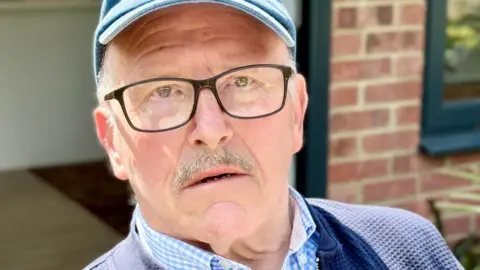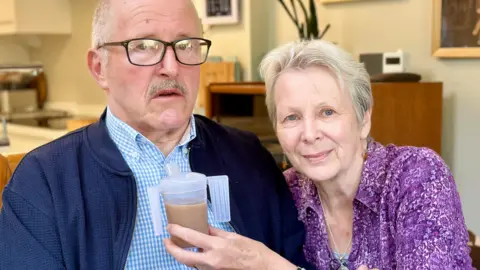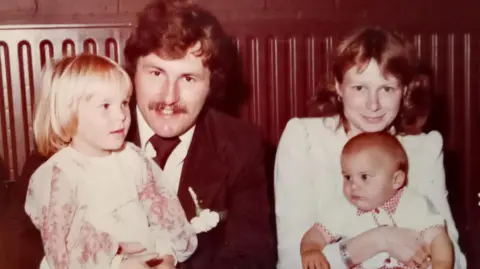Dementia patients and carers 'abandoned' after cuts
 BBC
BBC"We are exhausted and war-weary from crisis managing," Anne Scowen tells me as she prepares a beaker of tea for her husband Ray, who has severe dementia symptoms.
Anne is among dozens of dementia carers in Portsmouth calling for specialist dementia nurses in GP surgeries, after cuts to what they say was a "lifeline" service.
Last August a local hospice made the "difficult decision" to withdraw services provided by two specialist clinical nurses, which had been commissioned by the NHS via a mental health charity.
NHS Hampshire and Isle of Wight told the BBC all dementia services across Hampshire, Portsmouth, Southampton and the Isle of Wight are currently being reviewed.

"Devastated" when Ray was first diagnosed with Alzheimer's in 2019, Anne said they had "felt safe and in good hands" once the dementia services kicked in.
They went to a memory clinic, Ray went on a cognitive stimulation course and there were singing, art and social groups to go to almost every day in the week, she said.
But then they were discharged from the memory clinic, run by the older persons' mental health team, once Ray's course was completed and were told to go to their GP surgery if they needed more help in future, says Anne.
It felt, she says, like being "thrown off a cliff without a parachute".
 Scowen family
Scowen familyAnne says that as Ray's dementia worsened, the support they had in the community "gradually died off".
Then, when Ray could no longer talk, walk or sing anymore, she says they were asked to leave the last remaining support group available to them, so that patients who were more able could benefit instead.
Anne says: "I was completely shocked to my core, as they know dementia is a degenerative disease, so of course people's abilities deteriorate as the disease progresses.
"At the time, we still had our wonderful dementia nurses as a lifeline, but not any more.
"These highly experienced nurses were my crutch - take away my crutch and I am a gibbering wreck.
"We had support and then we didn't. We feel abandoned."
Anne says she has found it incredibly difficult to get a face-to-face doctor's appointment so she uses the e-consult service, which usually results in a short message of instructions or a prescription from her GP, leaving her no way of clarifying anything.
'Google it'
Anne could barely believe her luck recently, when an occupational therapist asked her local GP surgery to arrange a home visit and dementia review for Ray.
"Those visits are like gold dust!" she says.
Ray, whose dementia is entering the final stages, had been having severe spasms in the night.
Anne says: "A very nice nurse came out, took bloods and blood pressure.
"But, when I asked her about the spasms, she said she wasn't trained in dementia and suggested I google it.
"I didn't know whether to laugh or cry."
Anne and other carers describe how "difficult" it is to work out who is responsible for which dementia service and how to access help.
There are charities and NHS funded services providing support and activity sessions but many require a GP referral.
The Wessex Local Medical Council, which represents GPs in Portsmouth, stressed surgeries are already known to be "overstretched" and "overwhelmed" with rising demand.
It said: "Sadly, without additional funding, general practice would not be able to employ additional staff such as these nurses.
"Portsmouth is already the area with the second lowest number of GPs for their population in the country, due to low national funding."
NHS Hampshire and Isle of Wight is an Integrated Care Board, responsible for planning, delivering and funding primary care services across the county.
A spokesperson for the board acknowledged a "growing population" of patients with dementia and said specialist clinical dementia services are available via a referral from a GP.
They added: "We are currently reviewing all dementia services and we will be working with our communities and partners to understand the support that is needed for people with dementia and look to develop equitable access for this."
You can follow BBC Hampshire & Isle of Wight on Facebook, X (Twitter), or Instagram.
